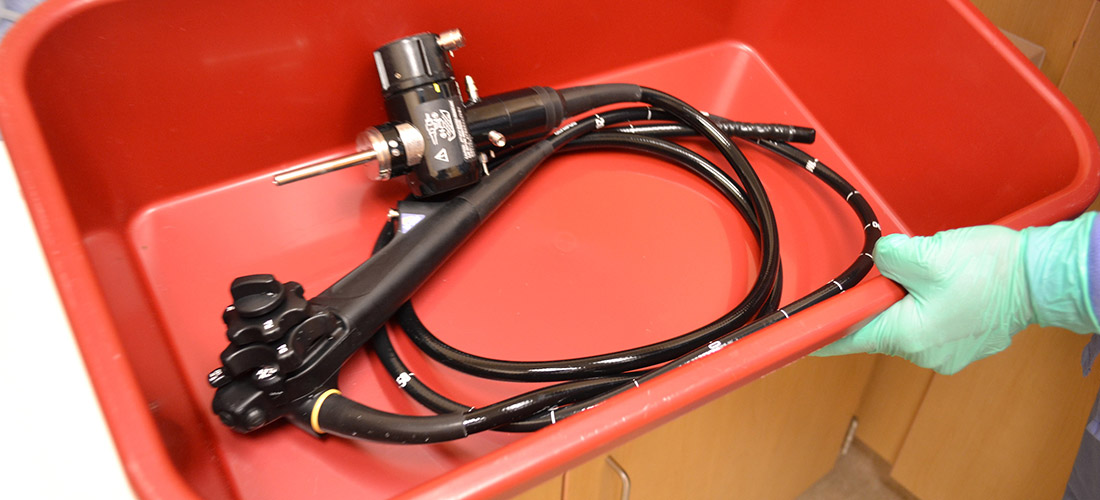Achieving High Reliability in Flexible Endoscope High-Level Disinfection
By: Aorn Staff
Published: 4/6/2022
Achieving High Reliability in Flexible Endoscope High-Level Disinfection

The Periop Life sat down with the first-place poster winners in the evidence-based category presented at Global Surgical Conference & Expo 2019, authors Daniel Fedderson, BSN, RN, MAJ, AN and Kenneth Romito, MSN, RN, MAJ, AN, to learn how one perioperative team is achieving near 100% compliance with standardized processes for endoscope reprocessing.
The intricate design of flexible endoscopes and multiple steps required for cleaning and high-level disinfection (HLD) make the process vulnerable to human error.
As perioperative nurses, we know that missing just one step or failure to complete any phase in endoscope reprocessing can result in patient exposure to harmful contaminants that can lead to infections, increased hospital stays, increased medical costs, and even death.
Auditing the Process
We recommended applying an evidence-based approach to improving standardization around reprocessing flexible endoscopes within our organization, and implemented audits conducted at three-month intervals with feedback to stakeholders to establish a standardized approach.
These four practices were key to effectively and successfully implement the audits:
- Use an audit quality feedback loop administered at regular intervals consistently over time.
- Measure clinical practice against well-established standards and/or evidence-based practice.
- Incorporate a multidisciplinary approach with an established leader or facilitator to conduct and analyze the audits.
- Assess leadership, education, training, and competency in addition to clinical practices as part of the auditing process.
Achieving Compliance
Robust leadership buy-in proved invaluable in implementing these audit best-practices by driving the changes in clinical performance and standardization of policies and equipment. However, building a structure around auditing best practices for safe endoscope reprocessing was a first step. Next, we needed a way to address ongoing process compliance.
To achieve buy-in among every team member, we focused on establishing a culture supporting the Highly Reliable Organization (HRO) goals of quality, safety, and continuous process improvement around endoscope reprocessing.
Three specific principles of high reliability in particular made the difference:
- Preoccupation with failure—To prevent process failures, each audit focused on quality loop iteration, diminishing gaps between observed practices, evidence-based practice recommendations by professional organizations, and manufacturer IFUs.
- Deference to expertise—By applying the HRO principle of deference to expertise, we established a task force with subject matter experts empowered to transform HLD practices within the framework of our evidence-based audit process.
- Commitment to resilience—The HLD task force became a fully chartered HLD committee with a full-time employee hired as committee chair to support the organization’s commitment to the HRO goals of quality, safety, and continuous process improvement related to HLD.
These efforts continue to prove successful. After our fourth audit of established processes in September 2018, which included 65 steps across five clinics, our team achieved a 96.9% compliance rate. Today the work of the HLD task force continues, as do our measured successes in safer endoscope reprocessing.
AORN conference attendees can view all the posters until May 26.
Flexible Endoscope Resources – FREE for Members
Guideline for Flexible Endoscopes Webinar
Provides guidance for processing all types of reusable flexible endoscopes and accessories. Watch now.
AORN Journal : "The Importance of Leak Testing Flexible Endoscopes"
This article discusses a case scenario focused on improving the quality and consistency of leak testing endoscopes. Read now.
AORN Journal : "Contaminated Instruments Present Patient Safety Issues: The Role of the Perioperative Team"
The provision of clean instruments for use during surgical procedures is a team effort between perioperative and sterile processing department personnel. Read now.
Daniel Fedderson, BSN, RN, MAJ, AN and Kenneth Romito, MSN, RN, MAJ, AN, are Adult-Gerontology Clinical Nurse Specialist with Perioperative Foci students at the Uniformed Services University of the Health Sciences. They will graduate with their Doctor of Nursing Practice in May 2019. Daniel and Kenneth earned first place in the evidence-based category for their poster sharing this work at AORN Global Surgical Conference and Expo last month.

